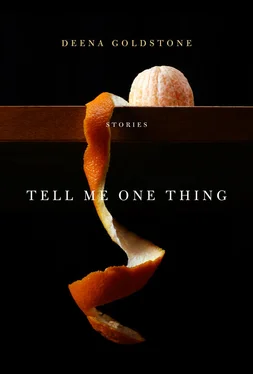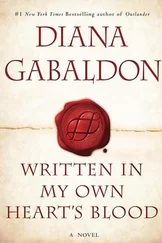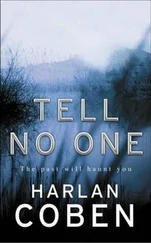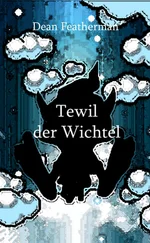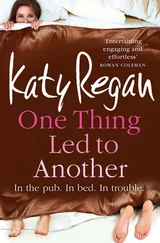The garden doesn’t look its best, even Trudy can tell that. In the San Gabriel foothills the summer heat has done its work. The more tender plants are burned and shriveled, the astromerias beaten back into the relative cool of the soil, the sunflowers drooping and brown. The raised vegetables beds hold ripening peppers and eggplant — they love the heat — but the heirloom tomato plants, more delicate, are stalks of crackling brown shafts.
She sees Brian here — digging and weeding and amending and cutting back and turning with an enormous grin that could have graced the face of a seven-year-old who’s just hit a home run to show her two arms full of peppers and tomatoes and trombone squash three feet long.
She remembers all the early evenings when she’d come home from work to find him planting the lettuce seedlings that would soon fill their salad bowl or pruning the bougainvillea before it brought down the trellis attached to the garage or spreading his homemade compost around the rosebushes. And she’d pour two glasses of wine and take a book and come out to the backyard.
He’d always turn with surprise— Is it so late already? And she’d take a chair and sit close to him and read to him as he finished whatever job he’d started. And the sun would go down and the light would turn purple and they would finish their wine and Brian would finally stand up, his gardening pants patched with mud, and they would be happy. Completely happy. Both of them.
She doesn’t know what she’s going to do about the garden — none of Brian’s gardening knowledge has rubbed off on her — but she knows she must deal with the clothes. And so she walks back into the house to finish.
ON MONDAY, TRUDY GOES BACK to work. Clementine, the assistant librarian, is horrified to see her.
“Oh no, Trudy,” pops out of her mouth before she thinks. “It’s too soon.”
“Who makes the rules, Clemmie? You?”
“But I thought you’d want to take maybe another week—”
“To do what? Mope around the house?”
“But you loved Brian” is what Clementine says.
Tears spring to Trudy’s eyes. “That’s not going to stop,” she says crossly. “That’s the problem, it doesn’t stop with death.”
Clementine doesn’t know what to say. She’s never managed to find a way to comfort Trudy about anything and especially not about anything this important, but she feels compelled to try. “You have all those wonderful memories—”
“That makes it worse, don’t you see? I want what I had. Just exactly what I had. Thirty-two years wasn’t enough, do you understand?”
Clemmie nods. She does. You could feel it when they were together — that they couldn’t get enough of each other. She often pondered that. Brian was nice enough, but he could be daunting to talk to — small talk, pleasantries, seemed to make him even stiffer and more uncomfortable. And as much as Clementine has gotten used to, even found an affection for Trudy, she still can see that Trudy is not the easiest of people to be around.
“What happened to the blue beanbag chair?” is what Trudy says now, her tone accusatory as she makes a beeline to the children’s section. She stands in the reading corner, where large floor pillows, a green and yellow rug, and small wooden chairs are set up in a loose semicircle.
Years ago Trudy divided the library’s modest space into a children’s section on the left and an adult section on the right. It escapes nobody’s notice that the children’s area is twice the size of the adults’ and much more thoughtfully furnished with several small worktables and chairs, a play area with Legos, a wooden train set, and a table that holds picture books open to the most enticing illustrations. And, of course, the reading corner, where every Friday afternoon Trudy transforms into the Story Lady, complete with medieval costume and rhinestone tiara.
By contrast the adult section looks bereft. There are the stacks, a few large rectangular tables, and two old computers, back to back, set up against a wall.
The double glass doors of the entry open directly to the transaction desk where Clemmie now sits, and behind it is a small glassed-in cubicle with one desk for her and one for Trudy.
“The blue beanbag chair?” Trudy demands again. “The one Graham always likes to sit in?”
“It split, Trudy. We had stuffing all over. Really, there was no saving it.”
“That’s what I get for taking any time off whatsoever. You threw it out, didn’t you?” And without waiting for an answer, “Perfectly good chair.”
Clementine opens her mouth to respond, then quickly closes it. Despite her youth — she’s young enough to be Trudy’s daughter — Clemmie has learned not to argue with Trudy. Softly now, Clementine says only, “I’m glad you’re back.”
When Trudy’s at the library, the hours go. They pass, and somewhere inside Trudy the rhythm of it lulls her into thinking that maybe she can get through the days. But then she has to go home. It is the stillness of the air in the house when she first opens the front door that does her in — it is Brian’s absence made tangible. And it assaults her, like the reverberations of a bomb detonated miles away but still terrifying. Her legs give out and she grabs the nearest chair, the one in the living room that looks out over the front garden. And she sits there, sometimes until the old-fashioned streetlights (which she’s always loved) go on and the neighbors are finished walking their dogs for the evening and the streets are still and dark.
It is only then that she can manage to stand up, walk into the bedroom, and climb into her side of the bed. She sleeps near the edge in the clothes she put on that morning, desperate not to roll over and feel the emptiness where Brian’s long body once lay. She cannot, she simply cannot, confront the loss every night of his arms, which enfolded her body and made her feel, if only for those hours, as if the world were a safe and generous place.
They were an oddly matched pair, Trudy short and round, Brian resembling a whooping crane with all the angles and odd posturing that those birds employ. They never saw the mismatch. Trudy found in Brian an unusual grace, and Brian was always reassured that Trudy fit so easily into his embrace.
They were the sort of couple that most people didn’t understand — the attraction, the connection, the longevity. She’s so caustic, it was often said, such a brusque sort of person. He was so quiet, that’s the first thing people noticed. The sort of guy who could sit in a crowded café—in fact could often be found at a window table at Sully’s Coffee on Fremont Street — head down over his laptop, oblivious to his surroundings, startling if you happened to say hello to him. A detail sort of guy, people would say, precise, as befit someone who restores historical buildings. Brian relished spending weeks matching replacement tile colors to the original hue, painstakingly uncovering crown moldings under decades of paint, preserving creaky window hinges that only he understood were beautiful.
This is where his architectural degree from the University of Southern California got him — a career in historical restoration. Instead of creating new buildings as he had once envisioned, he spent his days preserving and making beautiful what had been neglected and overlooked. He eventually made peace with the way things had worked out, never quite understanding why his own visions had never been enough.
He had struggled as a young architect, finding the give-and-take process of designing and reworking and adapting and redesigning a mystery. Clients complained to the head of his firm that he didn’t seem to listen to them or that the new drawings had nothing to do with what they had discussed. Brian was always baffled by these comments. He had tried, he really had, to give them what they wanted, but collaboration was not his strong suit. He took their corrections and began to alter the blueprints, but somehow, during the rethinking and the redrawing, the concerns of the clients seemed to vaporize into thin air and the drawings took on a life of their own. Brian was frequently astonished at the finished product but usually also very pleased. It was as if he had been in a trance, a creative maelstrom, as he drew, and then, suddenly, here was an entirely new design. Wonderful, he always felt. His clients were more often than not bewildered.
Читать дальше
